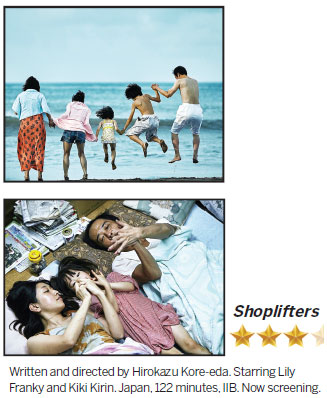Family matters, Japanese-style
Updated: 2018-07-06 06:45
(HK Edition)
|
|||||||
Hirokazu Kore-eda has become a Cannes Film Festival favorite since his breakout in 2004 with Nobody Knows, a then-fresh exploration of family as it exists in Japan, filtered through the story of four abandoned children in Tokyo. That film cemented the theme Hirokazu would return to again and again - actually begun in Distance the year before - that of the nuances, forms, pressures, and the very definition of the family and its bonds. With the exception of a murder mystery last year (The Third Murder), Hirokazu's last five films have been a drama about the validity of blood as the only metric for family. These include Our Little Sister, a story about four grown women who discover they have a 14-year-old sister, and After the Storm, a tale of a washed-up writer behind on his child support and trying to reclaim a place in his son's life. More often than not Hirokazu uses the family as a metaphor for, or reflection of, all that ails Japanese society, and that's precisely what he's done with this year's Palme d'Or winner, Shoplifters.
Inspired by a news item, Hirokazu's latest revolves around a Fagin type, Shibata Osamu (played by Hirokazu regular Lily Franky) and his band of artful dodgers, struggling to make a living in Tokyo by fraud, trickery, and shoplifting. On a trip to pilfer food and supplies for his family on a cold winter night, Osamu and his son Shota (Jyo Kairi) stumble upon abused five-year-old Yuri (Sasaki Miyu) freezing to death on a balcony. They take her home and give her a warm bed and a meal. Osamu's laundry-worker wife Nobuyo (the fabulous Ando Sakura, 100 Yen Love) wants nothing to do with the trouble she's sure the girl will bring, but everyone quickly becomes attached to Yuri, including Shota, his peep-show object sister Aki (Matsuoka Mayu), and pensioner grandmother Hatsue (veteran Kiki Kirin). Above all, Yuri blossoms in the embrace of this loving family.
Shoplifters could easily have fallen victim to all-too-common 'nobility of poverty' tropes that condescend equally to characters and audiences, but Hirokazu is so acute in his observations of how damaged people somehow find each other and construct their own families, rooted in empathy, and so unfussy in his direction (no eye-straining camera movement here) that it's hard to resist the film's emotional punch and richness of storytelling. The idea that the Shibatas are happy, sweet, loving and, in a way, honest despite being petty thieves, where Yuri's law-abiding parents are miserable, cruel, cold and dishonest is far from subtle, but the naturalistic performances make the facile complex, and the clichd insightful.
This is a Hirokazu film, so nothing good lasts forever. The television broadcasts news of the girl's disappearance daily, and none of the Shibatas ever utters the word 'kidnapping,' which is what they've done; they've shoplifted a human. Eventually the police start snooping around, which ultimately leads to a cascade of devastating actions, reactions and revelations that threaten the fundamental bonds of the Shibata clan. But not before Hirokazu has once again demonstrated what makes him Japan's best working filmmaker.

(HK Edition 07/06/2018 page11)